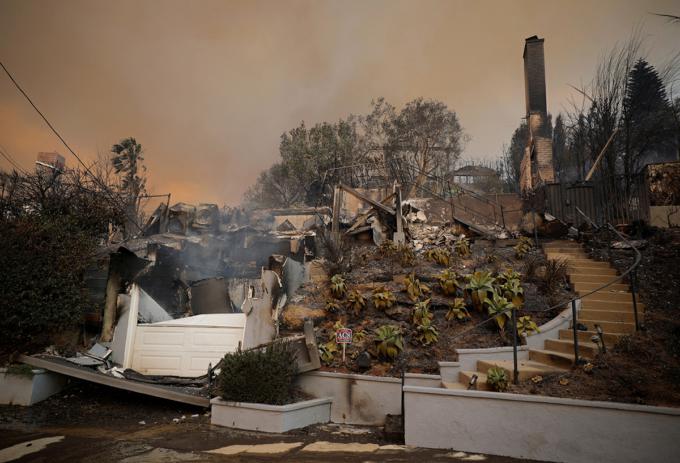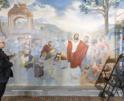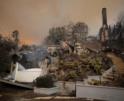
Culture
. . . I find myself weeping at the loss, weeping at the remorseless erasure of a community, of a man's dream, of a place filled with wonderful human beings who had no idea what would one day befall it.

Erlandson
I have trouble talking about the loss without tearing up, as if the smoke and ash from Los Angeles traveled across country to find me.
My in-laws were French immigrants to California, proud Americans, hardworking and simple in their aspirations. Joseph Bischetti knew extreme poverty in France, and he believed the best way to take care of his family was to work hard and buy land.
In the mid-1970s he and his wife Andree purchased a modest house with a big yard in Pacific Palisades. He could not have known then how that area and its prices would grow, how celebrities and other wealthy elites would move there for the same reasons he did. The Palisades felt separate from the rest of Los Angeles. It was backed up against the Santa Monica mountains, and as the population grew, newly erected houses slowly climbed the hillsides, along winding, narrow streets snaking down to Sunset Boulevard.
The neighborhood he moved into was full of little stucco houses, small and cute, modestly remodeled, with lawns and flower beds. People who lived in this neighborhood expected it to be the last move they made. They weren't rich, but they had a slice of heaven and planned to stay. Younger couples became older couples, then widowers or widows.
When they had to sell, the people who replaced them tore down their houses and squeezed mcmansions onto their lots. Two or three stories, with private theaters and pools and always a balcony or a rooftop patio pointed toward the Santa Monica Bay. People paid top dollar for the sense that one was far away from freeways and strip malls and congestion.
Joe and Andree did not have such grandiose plans. The house was their dream, their refuge. It was a single floor, a simple stucco house -- three bedrooms, a great room and a kitchen. Andrée, who was a wonderful cook, put up with a recalcitrant stove but never allowed a microwave to enter.
The windows were open most of the time, and no matter how hot Southern California was, the house would catch the breezes blowing from Santa Monica Bay. The wind blew in off the ocean, up the canyon's edge on which the house sat, over the fava beans, tomatoes and zucchini that Joe had planted, past Andrée's basil plants, and into the house, where it mingled with the smells of couscous and pasta and coq au vin.
Joe was a remodeling contractor who spent much more time working on other people's houses than on his own. Yet, when he was 80 years old, he single-handedly put on a new roof. Despite his age and his arthritis, he carried the heavy shingles up a rickety ladder and methodically reroofed it to his standards.
"Greg," he said proudly, "this roof will last 50 years." He wanted my wife and me to live in the house. To pass on his property would have been a dream fulfilled. I would always nod noncommittally, having taken his daughter and his four grandchildren to the other side of the country.
I am thankful that Joe did not live to see what happened on Jan. 7, 2025, for it would have broken his heart for sure.
The breezes vanished, replaced by snarling Santa Ana winds blowing westward from the desert. Somewhere a spark metastasized into a flame, and a flame into an inferno. Like marauders galloping out of the foothills, the flames swept down on the community that liked to call itself a village, as if its boutique shops and restaurants somehow protected it from a harsher world.
Not just Joe's house was reduced to ash, but every house around it for miles. The high school his children attended, the church where I married his eldest daughter, the hardware store he bought supplies at.
Gone in a day were the fruit trees he planted in the front yard, the canyon full of wild anise and chaparral his grandchildren would excitedly explore when they came to visit, the weathered basketball hoop, the basil, the lemon-scented Eucalyptus leaves.
No one was killed at that house that terrible day, although my brother-in-law stayed as long as possible watering that roof meant to last 50 years. Yet I find myself weeping at the loss, weeping at the remorseless erasure of a community, of a man's dream, of a place filled with wonderful human beings who had no idea what would one day befall it.
We have our memories, my wife said. We do indeed. That must suffice, I know. But it does not.
- Greg Erlandson is the former director and editor-in-chief of Catholic News Service.
Recent articles in the Culture & Events section
-
Scripture Reflection for Jan. 19, 2025, Second Sunday in Ordinary TimeDeacon Greg Kandra
-
In Pacific Palisades, paradise lostGreg Erlandson
-
Happy New Year!Eileen McLaughlin
-
Joyful hopeMichael Reardon
-
Scripture Reflection for Jan. 5, 2025, The Epiphany of the LordDeacon Greg Kandra























